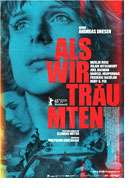

Opening 26 Feb 2015
Directed by:
Andreas Dresen
Writing credits:
Wolfgang Kohlhaase, Clemens Meyer
Principal actors:
Merlin Rose, Julius Nitschkoff, Joel Basman, Marcel Heuperman, Frederic Haselon
Five boys’ friendship develops into a brotherhood in their teens. In grade school, their uniforms sport red scarves in the 1980s Leipzig, East Germany; socialist studies, marching, and rallies are standard. But in 1989, the Wall crumbles and the West comes flowing in. Dani (Merlin Rose), Rico (Julius Nitschkoff), Mark (Joel Basman), Pitbull (Marcel Heuperman), and Paul’s (Frederic Haselon) immediate world changes in degrees only later they can appreciate. We open with Marc and Dani reminiscing; Dani’s musings lock in on particular incidents from when their lives were still innocent and later, in flashback. Ruby O. Fee plays the token female the filmmakers do not seem to know what to do with.
Based on Clemens Meyer’s novel, and directed by Andreas Dresen with Wolfgang Kohlhaase’s screenplay, it is hard to understand who the target audience is. The protagonists as teenagers have great fun vandalizing, stealing, and boozing, with a brief interlude helping an old lady; after reunification the – let’s be honest – juvenile delinquents add drugs to their entertainment, and have to compete with enterprising criminals from the West. Issues surrounding Germany’s assimilation are ignored. Instead of looking into circumstances causing their behavior, personal history is ignored; the school principle and teacher seems flexible, firm, fair. Editing (Jörg Hauschild) and production/set design differentiates slightly; they are kids, they are teenagers, i.e. physical appearances and prop elements. The actors are proficient, as is Michael Hammon’s camerawork, the music and graphic elements. Disappointingly, this 117-minutes German film is redundant rather than substantial. (Marinell Haegelin)
The five boys are friends and went to school together at a time when Germany was still divided. They dutifully wore their red neck-scarf of the Junge Pioniere (young pioneers) to school, compulsory in the communist state. They learned how to march and sing patriotic songs. Only one boy in class refused to wear the neck-scarf, promptly getting reprimanded by the school master. A little girl confided to her friend that her family will soon move to the West. His shy question: “Do you no longer want to help build our socialist state?“
In the early 1990s the Wall is gone. Freedom! Dani, Rico, Mark, Paul and Pitbull are still inseparable friends. The disciplined children have become rebellious teenagers, stealing cars, damaging property, dealing with drugs, enjoying excessive drinking and shouting unrecognizable songs into the night. Encounters with a neo-nazi gang and fist-fights with bloody noses follow. Instead of freedom it looks like anarchy to me. Almost all the action is accompanied by extremely loud techno music.
Not having read the book by Clemens Meyer, on which Andreas Dresen based his film, I missed more coherence. Why are these teenagers acting so irresponsibly and at the same time outright stupid and naive? What actually were their dreams?
The five young principal actors, Merlin Rose, Julius Nitschkoff, Joel Basman, Marcel Heuperman and Frederic Haselon, have to be praised for their naturalness. But also all the supporting actors are well cast. The sets and the nuances in outfits might only be appreciated by anyone having lived in the DDR (probably with a bit of nostalgia), but it also helped as an orientation with the many confusing flash-backs. (Birgit Schrumpf)